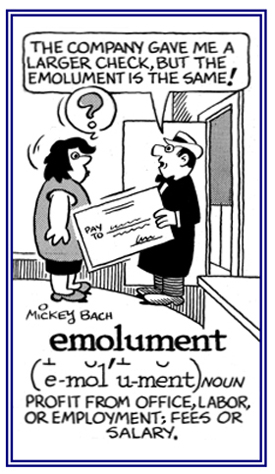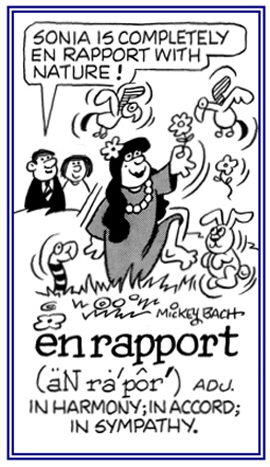en-, em-, el-
(Greek: in, into, inward; within; near, at; to put, to go into, or to cover with; as, entomb, encamp, enfold; to provide with; as, to enlighten; to cause to be; as, to enlarge; thoroughly; as, enmesh; in, within, into; as enzootic)
This prefix, en-, changes to em- before b, p, or ph.

Go to this Word A Day Revisited Index
so you can see more of Mickey Bach's cartoons.
2. Anything that is given great stress or importance.
3. Special and significant stress of voice placed on particular words or syllables as indicated by position, repetition, or some other indication.
4. Intensity or force of expression, action, etc.
5. Prominence, as in form or outline.
6. Etymology: from Latin emphasis, which came from Greek emphasis "significance, indirect meaning", from empha-, root of emphainein, "to present, to show, to indicate"; from en-, "in" plus phainein, "to show".
In Greek and Latin, it developed a sense of "extra stress" given to a word or phrase in speech as a clue that it implies something more than a literal meaning.

Go to this Word A Day Revisited Index
so you can see more of Mickey Bach's cartoons.
2. As seen in the title, Encarta World English Dictionary, it is in this case a lexicon published by Microsoft Corporation in addition to a digital multimedia encyclopedia and other related products.
Microsoft initiated Encarta by purchasing non-exclusive rights to the Funk & Wagnalls Encyclopedia, incorporating it into its first edition in 1993. Funk & Wagnalls continued to publish revised editions of their encyclopedia for several years independently of Encarta, but then quit printing in the late 1990s.
The name "Encarta"® is a registered trademark which was created for Microsoft by an advertising agency.
2. To move or to go around completely; to make a circuit of.
Susan's pleasant behavior endears her to her coworkers.

Go to this Word A Day Revisited Index
so you can see more of Mickey Bach's cartoons.
2. A person or group; especially, a military force, that fights against another hostile power in combat or battle.
3. A hostile nation or power.
4. Anyone who feels hatred toward, intends injury to, or opposes the interests of someone else; a foe.
5. Etymology: from Old French enemi, from Latin inimicus, from in-, "not" + amicus, "friend".
2. Exertion of vigor or power: "I have this project which is requiring a great deal of time and energy."
3. Vitality and intensity of expression; forcefulness of expression; such as, a speech delivered with energy and emotion.
4. Usable heat or power.
5. A source of usable power; such as, petroleum or coal.
6. In physics, the capacity to do work; the property of a system that diminishes when the system does work on any other system, by an amount equal to the work so done; potential energy.
Forms of energy include heat, light, sound, electricity, and chemical energy. Energy and work are measured in the same units—foot-pounds, joules, ergs, or some other, depending on the system of measurement being used. When a force acts on a body, the work performed (and the energy expended) is the product of the force and the distance over which it is exerted.
First recorded in 1599, from Middle French energie, from Late Latin energia, which was from Greek energeia, "efficiency, activity, operation" came from energos, "active, working" from en-, "at" + ergon, "work". Used by Aristotle with a sense of "force of expression"; the broader meaning of "power" was first recorded in English in 1665. To energize; that is, "rouse to activity" is from 1753; energetic of people, institutions, etc., is from 1796. The term energy crisis was first recorded in 1970.


